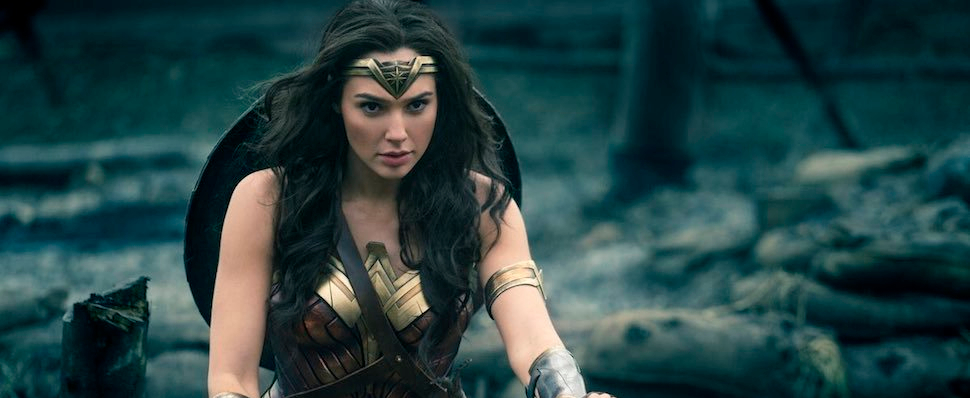(Photo courtesy of Warner Bros. Entertainment)
Disclaimer: This entry contains spoilers for “Wonder Woman.”
Last February, my English professor asked our class which characters in the media we consumed inspired the ideal of “hope.” Immediately my mind sprang to Superman. Or, at least, the character he used to embody. I’m sure you’ve seen or even heard of the image: the tall, muscular frame, a perfectly chiseled jawline, the incredible burst of primary colors, and that warm, inviting grin. You knew you could trust this man just by looking at him. This was the “Superman” I watched, the “Superman” I knew, and the hero I ultimately considered a role model. He saved cats from trees, minded his “sirs” and his “ma’ams”, stopped the nuclear proliferation of the West Coast, and “always told the truth.” This guy honored “Truth, Justice, and the American Way.” But Christopher Reeve, the man who first played Superman in the movies, ended his run thirty years ago.
 (Photo courtesy of Warner Bros. Entertainment)
(Photo courtesy of Warner Bros. Entertainment)
Christopher Reeve in Superman (1978)
There is something about today’s audiences that doesn’t embrace the concept of “cheesy”, whatever that means. Director Kevin Smith, who is a sort of king of the Comic-Con nerds, bemoaned 2006’s Superman Returns for having Superman “not throw a … single punch.” While I agree that Superman Returns was not as memorable as the original Reeve pictures, I contend that the lack of “Super-violence” is not a flaw of that film. With the advent of Christopher Nolan’s The Dark Knight trilogy, it seems that 21st century film fans believe that dark + edgy = good. I’ll also throw in some non-superhero films like Drive and John Wick to make my point because, well, people won’t shut up about them.
Don’t get me wrong, I enjoyed all the films I just mentioned. John Wick has spectacular action sequences, while Drive and The Dark Knight have masterful storytelling. But these films’ dark tone isn’t applicable to every movie in the Cineplex.
The recent Man of Steel and Batman v Superman: Dawn of Justice took a different approach to Superman, creating a brooding, more vindictive, Clark Kent. Though he says the “S” on his chest is a symbol of hope, I didn’t see much of that in these recent movies. The audience sees him punch the snot out of General Zod for threatening his mother, go into exile when people are killed at his congressional hearing, and even say, “No one stays good in this world” as he rushes off to kill Batman (yes, Superman was manipulated by Lex Luthor, but still!). It’s strange seeing a Superman who succumbs to the limitations of the human character, rather than rise above them.
Ostensibly, the filmmakers made this Superman to fit the stylings of modern blockbuster movies, but this approach doesn’t quite work because Superman is not Batman. The Dark Knight trilogy worked because the character has always been shrouded in tragedy—the dark tone works naturally there. For Superman, a character who, despite being an alien, has historically been the polar opposite of Batman, the popular Hero vs. the tortured Vigilante, this portrayal seems misinformed. Superman is not someone who needs to be down-to-earth, but rather rise above humanity. I remember a quote from 1978’s Superman in which Jor-El (played by Marlon Brando), says, “Even though you have been raised by human beings, you are not one of them. They can be a great people, Kal-El, they wish to be. They only lack the light to show them the way. For this reason, above all, their capacity for good, I have sent them you – my only son.” It’s a profound sentiment and, yet, we haven’t really seen it fulfilled recently in superhero movies. That is, not until June 2nd, 2017.
Like millions of others, I saw Patty Jenkins’ Wonder Woman this past week and was pleasantly surprised by what the film offered. While I have a few minor quibbles about the film itself, I’m glad for again having a hero who fights for something larger than herself. There’s something refreshing about Diana of Themyscira. There’s a scene in the middle of the movie where Wonder Woman, distraught by the notion of failing to save everyone in World War I, crosses No Man’s Land alone on the battlefield to liberate the village of Veld, where men, women, and children are being held hostage by Germans. Does it help to be wearing indestructible gauntlets that deflect bullets? Sure, but her selfless action galvanized the other soldiers to join her and that’s pretty cool.
 (Photo courtesy of Warner Bros. Entertainment)
(Photo courtesy of Warner Bros. Entertainment)
Gal Gadot in Wonder Woman
Diana fights for humanity and, though she is neither cynic nor idealist, she is a realist. In the end, Diana no longer sees the world in black and white, contending that every man has “darkness in their light” and that each person has a choice, regardless of a heroic symbol. Instead, she fights for love, which is what “will save the world” and I think this quality will ultimately save the superhero genre. When audiences are tired of watching the same kind of brooding hero, we will gravitate towards someone more wholesome and earnest; someone who inspires us to be our best selves.
That’s what a hero should be, anyway.
MARK BAUTISTA | KXSU Arts Reporter

